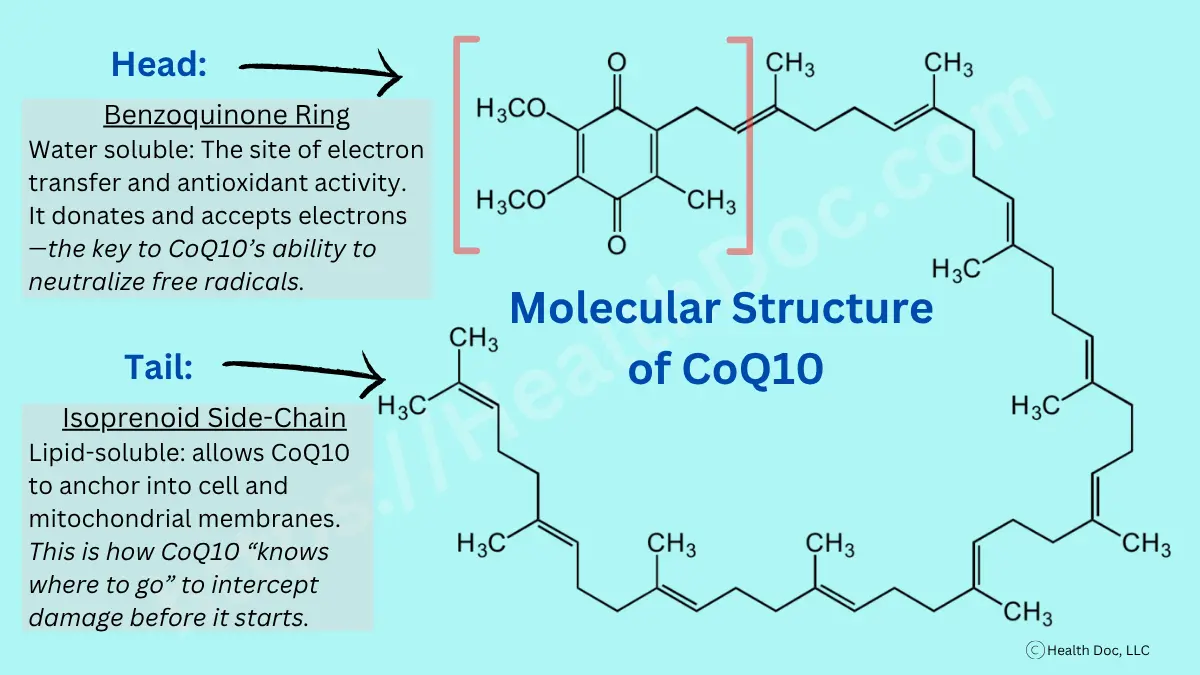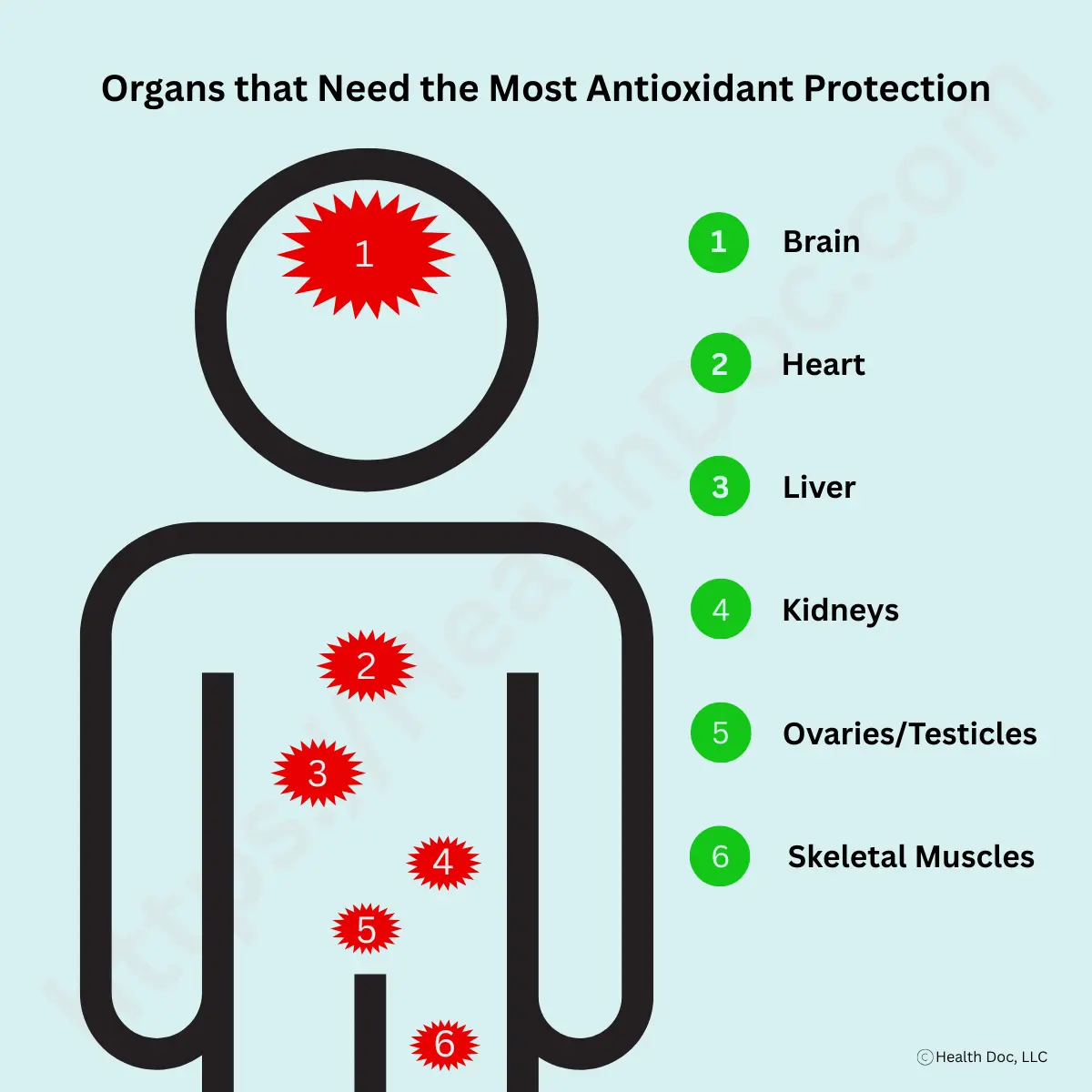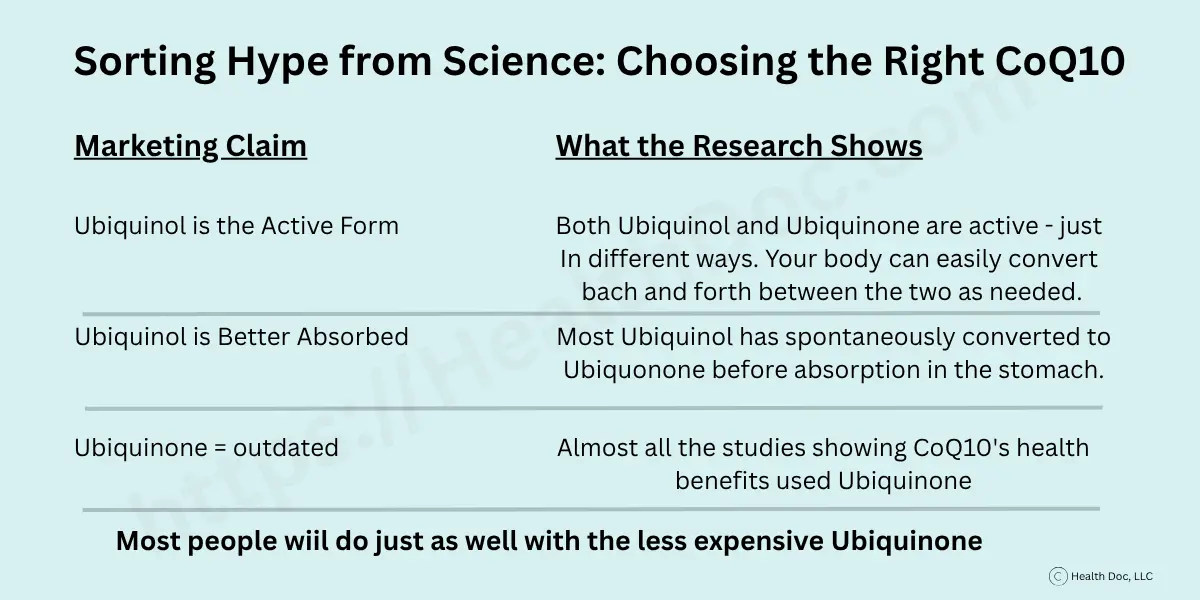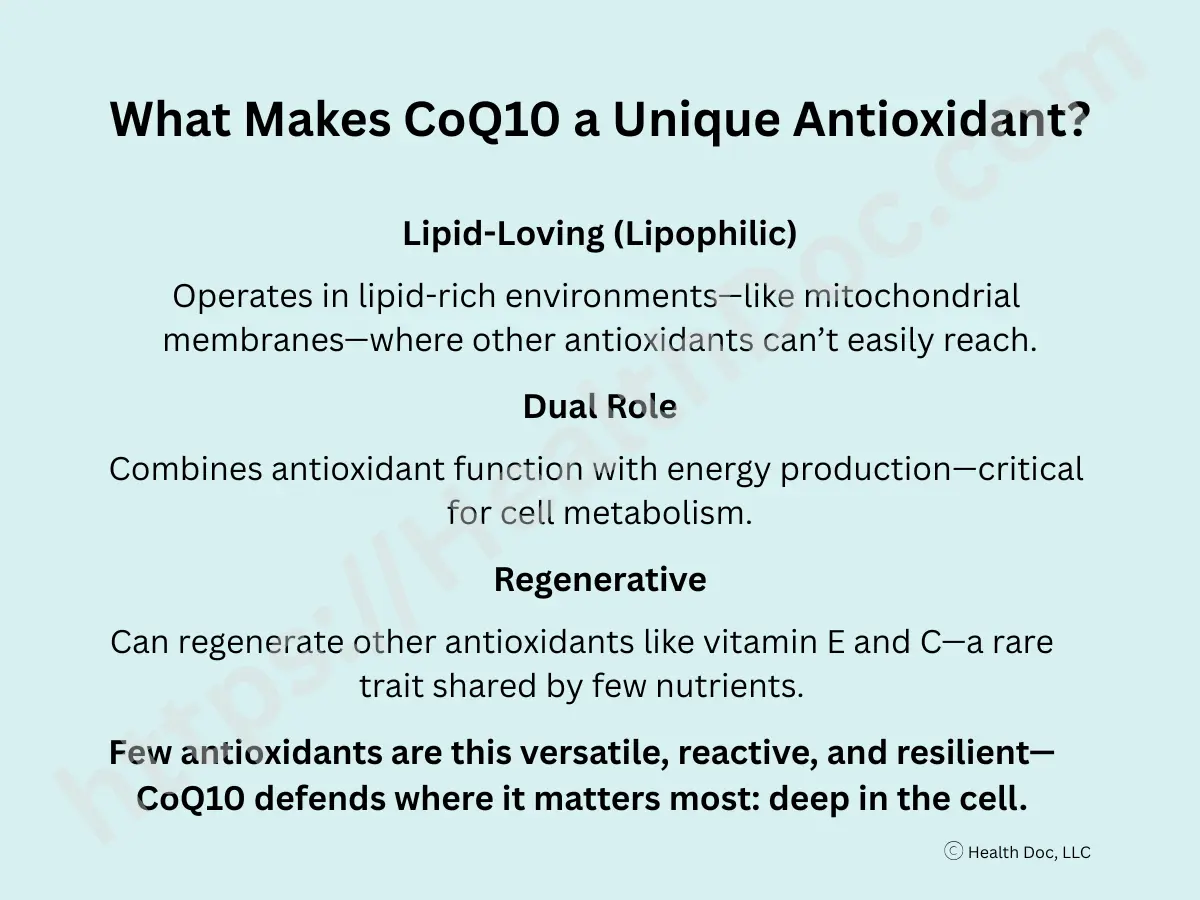Explore All Articles
Explore All Articles

Heart health, mitochondrial function, neuroprotection—and now, a growing link to reproductive vitality. This isn’t your average antioxidant.
You’ve probably heard the term “antioxidant” tossed around in articles, supplement ads, or even on your multivitamin bottle. But what does it really mean—and where does Coenzyme Q10 (CoQ10) fit into the picture?
Let’s dive deep into how this molecule acts as a critical line of defense against oxidative stress, and why its antioxidant powers may be more important than you realize.
CoQ10 is a vitamin-like compound made naturally in your body. Although it is involved in a number of cellular processes, it has two main roles:
CoQ10 exists in two forms:
Ubiquinol (reduced): serves as an active antioxidant, donating electrons to neutralize free radicals.

Its quinone head makes it chemically reactive, while its long isoprenoid tail allows it to embed into your cell membranes. That’s important because many harmful oxidative reactions start in those membranes.
In short: CoQ10 doesn’t just float around waiting to help. It plants itself in the exact locations where oxidative damage is most likely to happen—and stops it at the source.
Free radicals are molecules with unpaired electrons—which makes them highly unstable. To stabilize themselves, they’ll steal an electron from any nearby molecule. That might calm the free radical down, but it damages whatever ‘donated’ the electron in the process. This kind of damage is known as oxidative stress.
Your body produces free radicals as a normal byproduct of cellular energy production—especially in your mitochondria. But you're also exposed to free radicals from the outside world, including air pollution, tobacco smoke, heavy metals, UV rays, and even EMF radiation.
Think of free radicals as the biochemical equivalent of toddlers with scissors—eager to interact and often destructive, especially when left unsupervised.
Left unchecked, free radicals cause oxidative stress, damaging key components of your cells, including:
This cellular damage contributes to inflammation, premature aging, and an increased risk of chronic diseases such as:
Fortunately, your body isn’t defenseless. CoQ10 is just one of several antioxidants produced to proactively neutralize free radicals before they can cause harm. Maintaining a healthy balance between antioxidants and free radicals is essential to protecting your cells and supporting long-term wellness. But when that balance tips toward excess free radicals—due to age, illness, medications, or environmental stress—you may need additional support.
That’s where CoQ10 steps in.
Unlike many antioxidants, CoQ10 isn’t limited to the bloodstream or outer cell membranes. Because of its lipid-soluble nature, it distributes widely and reaches the areas where antioxidant protection is needed most. While the majority of CoQ10 resides in the mitochondria to support energy production, its antioxidant effects occur primarily elsewhere: in cell membranes, plasma, and lipoproteins, where it helps neutralize free radicals and protect vital cellular structures.
Here's how CoQ10 helps:
CoQ10 (especially in its reduced form, ubiquinol) donates electrons to stabilize reactive oxygen species (ROS) and lipid peroxyl radicals. What makes it special? It can do this without becoming unstable itself—a rare property among antioxidants.
It’s like a firefighter that runs into the fire and comes back out to help again.
Antioxidants don’t always work alone. In fact, many of them need help to keep doing their job. After neutralizing a free radical, some antioxidants—like vitamin E—become inactive. That’s where CoQ10 comes in.
CoQ10 helps recharge several key antioxidants, including:
This process is called redox cycling. It is a kind of molecular teamwork where CoQ10 restores oxidized antioxidants back to their active forms. Think of it as a biochemical pit crew: when vitamin E gets worn down from stopping free radicals, CoQ10 jumps in to refuel it and send it back into action.
This recycling effect amplifies the body’s overall antioxidant capacity, making CoQ10 a critical team player—not just a solo defender.
Every cell in your body is surrounded by a delicate membrane made mostly of fat molecules (lipids). These membranes aren’t just protective shells — they regulate what enters and exits, transmit signals, and help the cell function like a tiny, efficient factory.
But those lipids are vulnerable. Free radicals can attack them in a process called lipid peroxidation — which is just a fancy way of saying they turn healthy fats into dysfunctional, damaged fragments. It’s the same chemical process that turns old cooking oil rancid and unusable.
That’s where CoQ10 comes in. Thanks to its fat-loving (lipid-soluble) tail, CoQ10 naturally embeds itself into these membranes. From this position, it helps neutralize free radicals before they can damage the lipids.
Left unchecked, lipid peroxidation can:
In short, CoQ10 acts like a built-in shield, guarding your cell walls from oxidative attack.
Great — let's expand and refine this next section to match the evolved tone and insight density we’ve established so far. Here's a fully fleshed-out revision that incorporates analogy, cautionary nuance, and bio-functional clarity:
Think of your organs like appliances—some sip energy, others gulp it. Your heart, brain, liver, and kidneys are the industrial-strength machines of your body. They demand enormous amounts of oxygen and ATP (your body’s energy currency) to run 24/7. But there’s a catch: more oxygen means more free radicals.
That’s where CoQ10 earns its keep.
This powerful antioxidant is especially concentrated in these high-demand tissues—and that’s no accident. It helps meet their energy needs while guarding against the oxidative chaos that high metabolism creates.
Let’s break it down:

In short: Wherever metabolic activity is highest, the need for CoQ10 is greatest. Without enough of it, the same organs that keep you alive and thriving are the first to suffer.
⚠️ It’s important to note that CoQ10 isn’t a magic fix for any one condition—but its role in antioxidant defense and cellular energy makes it a critical player in maintaining organ health under pressure.
Absolutely—and often at the worst possible time.
As you age, your body’s ability to synthesize CoQ10 declines steadily. Unfortunately, this happens just as your oxidative burden increases due to slower recovery, chronic inflammation, and accumulated metabolic stress.
To make matters more complicated, certain common medications can further suppress CoQ10 production—leaving your cells even more vulnerable.
The most well-documented culprits include:
When CoQ10 levels drop—whether due to age, medication, or both—your antioxidant defenses weaken. That can increase the risk of oxidative damage in tissues that are already under strain, especially the heart, brain, and muscles.
⚠️ This is why many clinicians now recommend CoQ10 supplementation for people over the age of 40, those on statins, or those managing cardiovascular, neurological, or metabolic disorders. It's not just about energy—it's about protection.
And as always, speak with your healthcare provider before starting any new supplement—especially if you're on medication.
While CoQ10 isn’t a silver bullet, researchers have zeroed in on one unifying factor across many chronic conditions: oxidative stress. It's the common biochemical thread in heart disease, neurodegeneration, diabetes, and more.
Because CoQ10 plays such a unique dual role—supporting mitochondrial energy and neutralizing free radicals—it’s shown promise in managing several conditions where those systems break down.
Let’s look at some of the most studied areas:
⚠️ While research is still evolving, one thing is clear: oxidative stress plays a major role in these disorders—and CoQ10 may offer support by addressing that root cause.
Once again, talk with a healthcare provider who knows you, your history, and your health goals before making any changes to your treatment regimen. This includes starting new supplements.
Yes—but maintaining a balanced perspective is essential.
✅ What We Know:

❓ What We Don’t Know (Yet):
⚠️ If you're on medication—or managing a health condition—it’s not about avoiding CoQ10. It’s about making smart, informed decisions. A qualified provider can help you weigh the pros, avoid interactions, and choose the right formulation for your situation.
Most antioxidants do one thing well—whether that’s scavenging free radicals, protecting membranes, or aiding circulation. CoQ10, on the other hand, brings multiple layers of protection in a single molecule.
Here’s what sets it apart:
In short, CoQ10 is rare in its versatility, stability, and synergy. It doesn't just mop up damage—it helps keep your entire antioxidant system functioning at peak efficiency.

→ Want to explore CoQ10’s broader roles in energy, cardiovascular health, and longevity?
Grab our CoQ10 User Guide here: https://HealthDoc.com/coenzyme-q10/user-guide
CoQ10: A Small Molecule with Outsized Impact
It’s rare to find a nutrient that guards your cells, fuels your energy, supports your brain, and regenerates your antioxidant defenses—all in one.
CoQ10 does just that.
Curious how it compares across formulations, delivery methods, or dosages?
Explore our free, evidence-based CoQ10 User Guide to go deeper.
👉 healthdoc.com/coenzyme-q10/user-guide
No fluff. Just the science—and the strategy—to help you make smart, informed decisions.
When it comes to your health, antioxidant protection isn’t about magic—it’s about maintenance. And CoQ10 may be one of the most important molecules working behind the scenes to keep your cells strong, stable, and energized.
CoQ10 is a naturally occurring antioxidant in the body, crucial for cellular energy production and protecting cells from oxidative damage.
CoQ10, particularly in its reduced form, ubiquinol, neutralizes free radicals, thereby preventing oxidative damage to cells. It also helps regenerate other antioxidants like vitamin E and C back to their active states.
CoQ10 supports cell vitality and longevity by maintaining energy production and protecting cellular components like DNA and proteins from oxidative stress.
Yes, natural levels of CoQ10 in the body tend to decrease with age, which can impact cellular health and energy levels.
CoQ10 can be found in foods like meat, fish, nuts, and some oils and vegetables, but dietary intake might not be sufficient for certain individuals.
Individuals with conditions affecting heart health, those on certain medications like statins, and people seeking to improve energy levels, reduce fatigue, and enhance mental acuity may benefit from CoQ10 supplementation.
CoQ10 supplements are generally well-tolerated, but as with any supplement, there can be side effects. It's important to consult with a healthcare provider before starting any new supplement regimen.
Not necessarily. While CoQ10 is generally safe, individual factors like age, lifestyle, and health status can influence its effectiveness. People with conditions affecting their heart health, those on statin medications, and individuals seeking to enhance energy levels, reduce fatigue and muscle weakness, and to improve mental acuity are the ones most likely to benefit from CoQ10 supplementation. Always consult with a healthcare provider before making changes to your treatment regimen.
If you're considering supplementation and your healthcare provider agrees it could be beneficial for you, you can find high-quality CoQ10 supplements [here](https://HealthDocMD.com/store/coenzyme-q10) on the Health Doc, MD e-store.
Whether you are much interested in investing, our collection of articles is designed to educate and empower you.